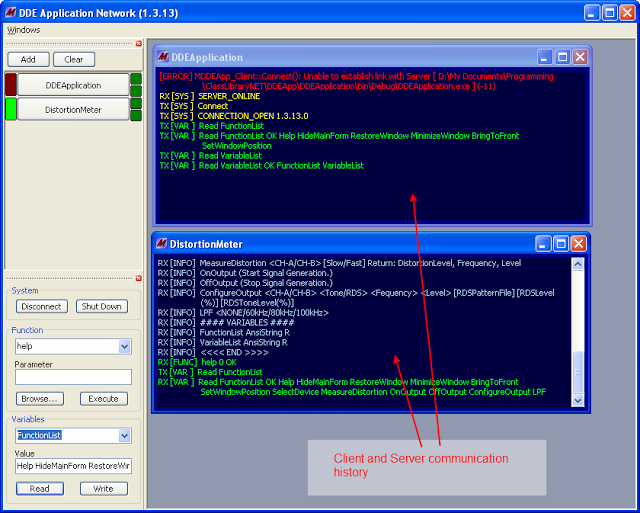DDEApp Library User Guide
| Supported OS | Windows 32-bit |
| Supported Platform | Borland C++ Builder 6 | V1.3.12 |
| | Borland Developer Studio 2006 | V1.3.12 |
| | Microsoft.NET (Framework 2.0) | V2.0.0 |
Introduction
DDEApp is an application communication framework based on DDE communication protocol in order to exchange information between applications.
This library was first designed to simplify and standardize DDE implementation for applications built on Borland C++ platforms. We have further extended the library to .NET framework to provide a bridge between .NET applications and C++ applications.
Using DDEApp Server (Step-by-step Instruction)
DDEApp Server is designed to “serve” DDEApp Client request. It can handle request from multiple clients but only one request can be processed each time.
Initialize
Call constructor to instantiate DDEApp Server. Only one server instance is allowed for each application.
Example:
[C++] MDDEApp_Server ddeserver = MDDEApp_Server::SingleInstance(this);
[C#] DdeAppServer ddeServer = DdeAppServer.SingleInstance(this);
Assign event functions to get notified for DDEApp Server events. Refer to programmer’s reference for list of events available.
Example
[C++]
ddeserver->OnClientConect = DDEClientConnect;
void __fastcall TFMain::DDEClientConnect(TObject *Sender){ }
[C#]
DdeServer.ClientConnected +=
new EventHandler<DdeAppEventArgs>(DdeServer_ClientConnected);
void DdeServer_ClientConnected(object sender, DdeAppEventArgs e) { }
Register Functions and Variables
DDEApp Server is ready for action after these two steps. It can now respond to DDEApp Client’s request. All built-in internal functions are ready for action. However, DDEApp Server has yet to have any information on functions and variables from your application. Thus, we need to tell DDEApp Server what are the functions and variables that can be access by DDEApp Clients.
Call RegisterFunction() / RegisterVariable() to expose application’s function and variable for client access. Name must be single word and unique. Function names are case insensitive.
Variable type <Type> are defined as DDEVARTYPE which currently support types integer (dvInt), double (dvDouble) and string (dvAnsistring [C++], dvString[C+]). Set <ReadOnly> flag to true for read only access for clients.
Example
[C++] ddeServer->RegisterFunction(<Function Name>, <Description>);
[C#] ddeServer.RegisterFunction(<Function Name>, <Description>);
Example
[C++] ddeServer->RegisterVariable(<Function Name>, <Type>, <ReadOnly>);
[C#] ddeServer.RegisterVariable(<Function Name>, <Type>, <ReadOnly>);
Event OnFunctionCall must be assigned to process registered function whereas OnVariableRead and OnVariableWrite must be assigned to process variable read / write operation.
Error Handling
Please note that all user interactive action and message box prompt should be switched off when application operates in DDEApp Server mode as any message box will freeze the server application. Exception thrown during DDEApp operation will be translated to message and forwarded to the client who initiates the operation.
Ready for Action
Finally, you may use Online() and Offline() to enable / disable DDEApp Server when required. No client message will be processed in Offline mode.
Your DDEApp Server is all set and ready for action.
Using DDEApp Client (Step-by-step Instruction)
DDEApp Client on the other hand is used for send command and request to Servers. Each client can be connected to many DDEApp Servers.
Initialize
Unlike DDEApp Server, there is no restriction on number of instance allowed for DDEApp Client. Theoretically, you may create as many clients as you wish. Each client can connect to multiple servers. DDEApp Client is created by calling its constructor.
Example
[C++] MDDEApp_Client ddeClient = newMDDEApp_Client(<MainForm>);
[C#] DdeAppClient ddeClient = new DdeAppClient ();
NOTE: For C++ version, Application Main Form must be forwarded to DDEApp Client’s constructor in order for DDE to work properly.
Assign Event
Assign event functions to get notified for DDEApp Client events. Refer to programmer’s reference for list of events available. Read DDEApp Server -> Assign Event.
For example. Events in DDEApp Client mainly is optional and for notification.
Connect to Server
A link must be established between DDEApp Server and DDEApp Client before any function call or variable read / write can take place.
Example
[C++]
int tHandle;
ddeClient->Add(&tHandle, <Server>, <Auto Launch>);
int tStatus = ddeClient->Conenct(tHandle);
[C#]
string serverName;
serverName = ddeClient.Add(<Server>, <Auto Launch>);
ddeClient.Connect(serverName);
Register server:
<Server> = target server application (full path)<Auto Launch> = automatic start server application if not startedserverName = reference name returned for current added server. Use for subsequent operation.
Connect to Server:
- Establish connection between client and server.
- If Auto Launch is enabled, DDEApp Client will attempt to connect with DDEApp Server when first registered.
- [C++] Function connect return
NULL if success. - [C#] Exception throw if connection if not success.
Execute Function
To execute function in DDEApp Server, all we just need is to execute FunctionCall() from DDEApp Client.
Example:
//Execute function without wait for return.
// handle OnFunctionReturn to get return status.
[C++] ddeClient->FunctionCall(tHandle, <Command>);
[C#] ddeClient.FunctionCall(serverName, <Command>);
//Execute function and wait for return.
// function must returned before timeout.
[C++] ddeClient->FunctionCall(tHandle, <Command>, &tStatus, &tReturn);
[C#] ddeClient.FunctionCall(serverName, <Command>, FunctionResult result);
Variable Access
Value for registered variable in DDEApp Server can be read via the following function.
Example
[C++] ddeClient->VariableRead(tHandle, <VarName>, <ReturnValue>);
[C#] ddeClient.VariableRead(serverName, <VarName>, VariableResult <Result>);
Call VariableWrite() in order to write value to variable which has write access.
Example
[C++] ddeClient->VariableWrite(tHandle, <VarName>, <NewValue>);
[C#] ddeClient.VariableWrite(serverName, <VarName>, <NewValue>);
Help Screen
There is a built in help information in DDEApp Server which allows DDEApp Client to get information such as basic usage information, library version, registered functions and variables from server. This information can be accessed by execute “Help” function from DDEApp Client.
Internal Functions
DDEApp Server is built in with some basic general functions such as: Help, HideMainForm, RestoreWindow, MinimizeWindow, BringToFront and SetWindowPosition. These functions name are internally reserved and may not be overridden. In other words, user is not allowed to use these names for their functions.
Using DDE Application Tool
About
DDE Application is a tool to simulate DDEApp Client. This tool can be used to test DDEApp Server enabled applications.
 |
| DDE Application Overview | |
 |
| Servers Manager |
 |
| Function Execution and Variable Read Write |
